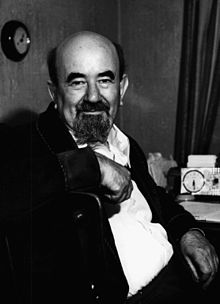Solomon Mikhlin
| Solomon Grigor'evich Mikhlin | |
|---|---|

Solomon Grigor'evich Mikhlin
|
|
| Born | 23 April 1908 Kholmech, Minsk Governorate, Russian Empire |
| Died | 29 August 1990 (aged 82) Saint Petersburg (former Leningrad) |
| Nationality | Soviet |
| Fields | Mathematics and mechanics |
| Institutions |
|
| Alma mater | Leningrad University (1929) |
| Academic advisors | Vladimir Smirnov, Leningrad University, master thesis |
| Doctoral students | see the teaching activity section |
| Other notable students | Vladimir Maz'ya |
| Known for | |
| Notable awards |
|
Solomon Grigor'evich Mikhlin (Russian: Соломо́н Григо́рьевич Ми́хлин, real name Zalman Girshevich Mikhlin) (the family name is also transliterated as Mihlin or Michlin) (23 April 1908 – 29 August 1990) was a Soviet mathematician of who worked in the fields of linear elasticity, singular integrals and numerical analysis: he is best known for the introduction of the concept of "symbol of a singular integral operator", which eventually led to the foundation and development of the theory of pseudodifferential operators. He was born in Kholmech, a Belarusian village, and died in Saint Petersburg (former Leningrad).
He was born in Kholmech, Minsk Governorate (in present-day Belarus) on 23 April 1908; Mikhlin (1968) himself states in his resume that his father was a merchant, but this assertion could be untrue since. in that period, people sometimes lied on the profession of parents in order to overcome political limitatons in the access to higher education. According to a different version, his father was a melamed, at a primary religious school (kheder), and that the family was of modest means: according to the same source, Zalman was the youngest of five children. His first wife was Victoria Isaevna Libina: the famous book (Mikhlin 1965) is dedicated to her memory. She died of peritonitis in 1961 during a boat trip on Volga: apparently, there had been doctor on board. In 1940 they adopted a son, Grigory Zalmanovich Mikhlin, who later emigrated to Israel Haifa, Israel. His second wife was Eugenia Yakovlevna Rubinova, born in 1918, who was his companion for the rest of his life.
...
Wikipedia
